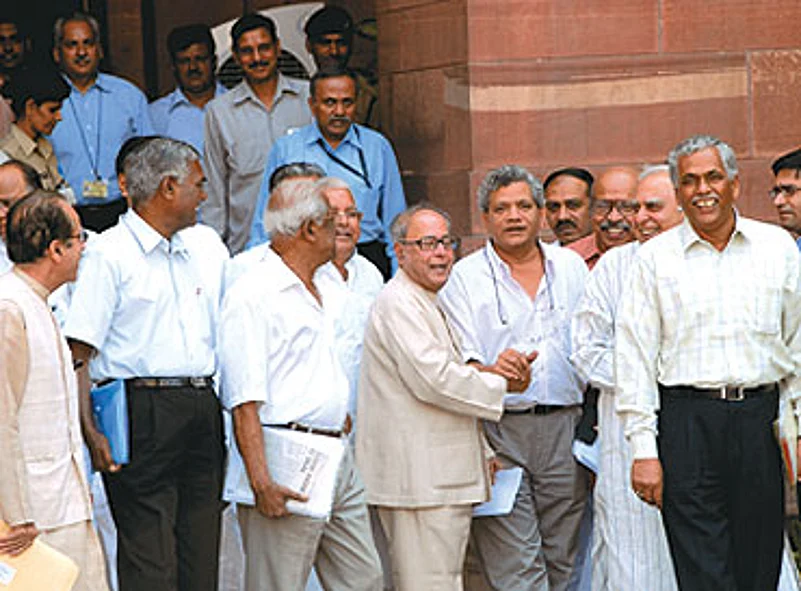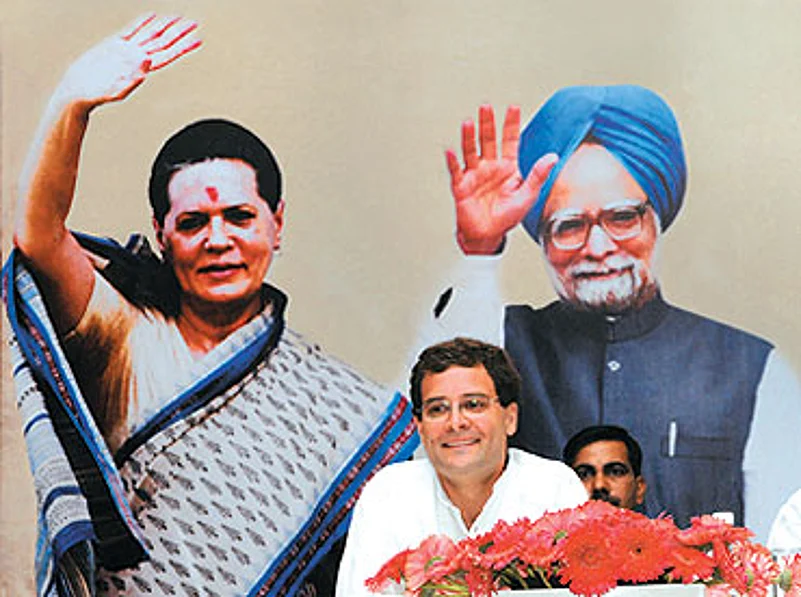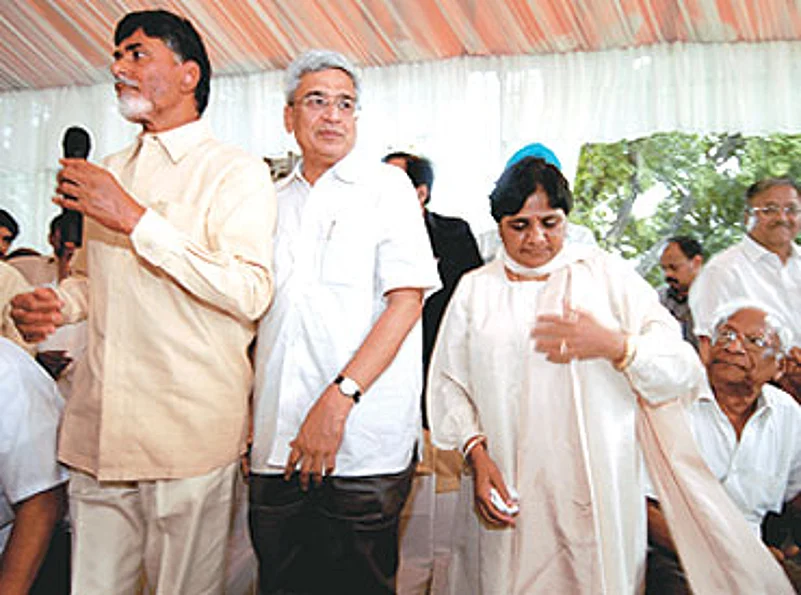- The Indo-US nuclear deal had become a war of egos between Prakash Karat and Manmohan Singh. The Left may not want to back him as PM for another term.
- The fact that the Congress won the trust vote despite it withdrawing support and pushed through the N-deal rankles with the Left.
- The pro-liberalisation policies of the Congress are out of sync with core Communist ideology.
- The two parties have been at each other right through the election campaign. Unlike in the past, senior Congress leaders have been very critical of the Communists.
- The Congress has worked towards undermining the Left in its West Bengal bastion. It has also tied up with its arch-rival, Mamata Banerjee.
- A section within the Left feels that having any truck with the Congress will only dilute its agenda.
***
- Fear of BJP government: If the Congress and allies get 180-190 seats, UPA won’t be able to call the shots. The Left may chip in with its 35-40 seats to keep the saffron alliance out. It will also help in wooing parties like the BJD, JD(U) and SP.
- Change of leadership: If the Left insists on Congress choosing a PM candidate other than Manmohan.
- Why not us: If the Congress does worse than expected and the Left+Others tot up 170-180 seats, the pressure will be on Congress to offer outside support or allow the various players to form a new front and seek the BJP’s support.
- Congress and BJP down: If both Congress and BJP do not muster 273, then the regional satraps will be in contention to form the government. Then Congress may be forced to back Left’s secular formation.
- Left fares Badly: If the Left tally falls drastically from 61, it may divorce itself from Karat’s hardline position and offer outside support to UPA rather than be completely left out.
***

Before the deal... Pranab Mukherjee was still placating the Left leaders back then. Above, after a Left-UPA meeting.
An essentially ideological battle—two competing visions of the future, if you like—has got personalised into a stand-off between Prime Minister Manmohan Singh and CPI(M) general secretary Prakash Karat. So much so that it seems almost impossible today that the next government will be big enough to accommodate both of them. But will their parties permit it? Manmohan Singh is the ruling Congress’s officially declared prime ministerial candidate; Karat is the prime mover of the Third Front. Can they come together again, despite the current war of words?
The answer to that question will determine the shape of the next government. A Congress-led government will be impossible without the support of the Left parties; conversely, a Third Front-led government—of which the Left parties are the driving force—cannot be formed without the backing of the Congress. If both fail, the only option would be a BJP-led NDA government, and all those opposed to divisive politics would be justified in blaming the Congress and Left parties alike if that were to happen. Unless, of course, a BJP-led NDA emerges as the single-largest combination and is given the first crack at forming the government, an action that could trigger defections from the UPA, the Third Front—and even the Fourth Front.

A Rahul Gandhi press meet in New Delhi
But are both the Left parties and the Congress equally obdurate about working together in the future? In the Left—particularly in the CPI(M)—there is a deep sense of betrayal at the way in which the Manmohan Singh government pushed through the Indo-US nuclear deal. The Congress, on the other hand, emerged with its government intact after the departure of the Left last year, thanks to some unexpected support from the Samajwadi Party, and is, therefore, in a relatively more charitable frame of mind. This has meant that positions on the Left side of the fence are more intractable; within the Congress, there is a general belief that the Left will come around.
What both sides have in common, however, is that neither has a problem accepting the support of the other. It’s just that, in the midst of an election, neither is prepared to say it will do so. "There is a lot of meeting ground with the Left," Congress general secretary Rahul Gandhi told journalists at a press conference last week. "I am pretty confident that the Left will support a Manmohan Singh government." The Left, though, is more circumspect. "The Congress must decide whether to support us or not," CPI general secretary A.B. Bardhan told Outlook, adding caustically, "We are told all the time that if we don’t support the Congress, we will be backing communal forces. Is it only the responsibility of the Left to block communal forces? We think the Congress is a secular party but it keeps accusing the Left that its policies are helping the BJP."
The current stand-off is, therefore, as much about ideology as it is about egos. "In the CPI(M)’s past experiments in coalition politics in Kerala and West Bengal, it has been the dominating force, so they have worked," says a senior Congress leader. He then adds, with a touch of irony, "We are remarkably similar to the CPI(M)—we like to be in the driver’s seat, not be subjected to backseat driving."
The chasm between the two also has a great deal to do with being in an electoral battle in which the two are adversaries. "Nations are governed by ground realities, not by dogmas or personal likes and dislikes," says senior Congress leader Devendra Dwivedi. "During a protracted electoral battle," he goes on to say, "many of us fail to make a distinction between electoral rhetoric, electoral dynamics, existing ground realities and the ultimate picture which will emerge after the elections." Dwivedi sees it as an "electoral imperative". "Every time Prakash Karat speaks," he says, "he is not addressing Manmohan Singh or the media, but his cadres in West Bengal and Kerala. Where there are only two adversaries, he has to adopt a strident anti-Congress posture, given the cadres have been brought up on an anti-Congress diet. It is an electoral imperative."
Congress media chairperson Veerappa Moily, too, believes that the post-poll scenario may spring "surprises". "The Left’s pre-poll compulsions will be different from its post-poll compulsions," he says. "The Left has to participate in the democratic process, whether supporting us or remaining neutral—the Left are not our enemies, they have been our friends. We only fell out on the nuclear deal, it doesn’t mean it’s forever. Besides, the Left had to part ways before the elections."
A senior Congress cabinet minister is not so sanguine, though. "In exchange for support to the Congress, the Left will demand Manmohan Singh’s head," he says. When you tell him that Karat has said that he is not concerned with personalities, only policies (see interview), he retorts, "That’s their public posture. Privately, I am sure they will insist on another name—Manmohan Singh is too closely identified with the policies they are opposed to."
Within the Left, too, there is disquiet at the direction the war of words could take. Privately, Left sources admit that it might have been better if Karat had not been so frontal in his attack on the Congress, leaving so little room for post-electoral manoeuvres. "The central committee," a senior Left leader told Outlook, "had decided that we would work towards a secular non-Congress, non-BJP alternative. But the question of what sort of government would be formed had been left till after the elections, when the numbers and the circumstances would decide the outcome. But the general secretary has been going ballistic every day. How will we retrieve the situation?" This is particularly as Left leaders are bracing themselves for a sharp drop in numbers. They admit that the 61 seats they won last time was out of the ordinary; on the other hand, if they drop below 40, their own capacity for leverage will diminish. And then, though the Left parties operate in a far more disciplined manner, there could be some tough questions asked at the central committee after the elections. A Congress minister says hopefully, "If the Left does badly, then the leadership question in the CPI(M) will come up." But even Karat’s critics in the Left feel that that would be unlikely: "That’s not the way we operate." Of course, Karat could get outvoted in the central committee, just as his predecessor Harkishen Singh Surjeet did when he suggested Jyoti Basu’s name for prime minister in 1996.
Indeed, barring Karat and Bardhan, most other party leaders are being cautious. "We will decide later what will happen post-election, but right now our objective till the elections are over is a Third Alternative," says CPI(M) politburo member Sitaram Yechury. "However, we do not think the need to support a Congress-led government will arise." CPI(M) central committee member Nilotpal Basu, asked whether the party could back a Congress-led government, is tight-lipped: "Right now we’re in the battlefield to form a secular non-Congress government."
What after the elections? Will the Left support a Congress-led government? "Our credibility will be at its lowest level if we back the Congress without any policy changes on their part, because we broke with them on policy issues," Bardhan told Outlook. "We have no (personal) quarrel with Manmohan Singh, our only quarrel is on policy. The benefits of growth are not trickling down. What will our credibility be if we go back quietly? If the Congress supports us, well and good. The decision will be theirs. Despite the Congress’s tall claims, they have fallen short of their promises. The economic policies of neo-liberalism have been disastrous for the world."
The most worrisome problem for the two blocs today, as a Left leader sees it, is that there is "a big trust deficit between the Congress and Left". But he does concede that "whatever happens, a government will have to be formed. And it is primarily for the Congress to bridge that trust".

Chandrababu Naidu, Karat, Mayawati at a Third Front meet
What about the Congress? Will it back a Third Front-led government, or will it prefer to sit in the Opposition, as Congress leader Digvijay Singh had asserted? A senior Congress minister said, "There are only two options—a Congress minority government (where with our UPA partners, we are at least 250) without the Left, and the Left gives us issue-based support. The only way such a government can come down would be if the Left votes with the BJP on the budget, financial bills or President’s rule. If we can’t form a government, we might not want to back a Third Front-led government. But if the prime ministerial candidate is Mayawati, we will be left without an option—we will have to back her."
The final comment comes from minister of state in the PMO, Prithviraj Chavan: "The dialogue with the Left will begin only after the 16th." An echo of the PM’s remarks to the Editors’ Guild last month: "An alliance with Left parties is possible only after the elections. Circumstances will decide if we go with the Left."
By Smita Gupta with Anuradha Raman


























